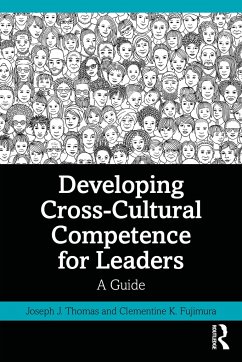
The Leader Label
Leadership in a Hyper-Diverse World
Versandkostenfrei!
Versandfertig in 6-10 Tagen
45,99 €
inkl. MwSt.

PAYBACK Punkte
23 °P sammeln!
Our Postmodern and hyper-diverse world isincreasingly calling for highly flexibleunderstandings of both leaders and leadership. Drawing on extensive research into the history andpractice of the subject, in addition to personalexperience, the author explores leadership throughthe lens of Social Constructionism, a framework thatprovides the flexibility necessary to ensure thatleadership is available to everyone, in all contexts;essentialist understandings (such as trait theory)are shown as outdated and ill-equipped to be workablein diverse environments. After establishing a broadtheoretical base...
Our Postmodern and hyper-diverse world is
increasingly calling for highly flexible
understandings of both leaders and leadership.
Drawing on extensive research into the history and
practice of the subject, in addition to personal
experience, the author explores leadership through
the lens of Social Constructionism, a framework that
provides the flexibility necessary to ensure that
leadership is available to everyone, in all contexts;
essentialist understandings (such as trait theory)
are shown as outdated and ill-equipped to be workable
in diverse environments. After establishing a broad
theoretical base from which to work, the author
describes a study that used Constructionism
successfully; investigating whether individual
leadership perceptions could be influenced (since
they are constructed socially) through the use of
metaphor and narrative, which have been proven to
effect the way in which we all perceive the world.
Results of this research indicate that leadership
perceptions can be influenced, and that leaders and
leadership are, essentially, fully subjective and
socially constructed realities. Implications are
myriad, but point to developing leaders differently.
increasingly calling for highly flexible
understandings of both leaders and leadership.
Drawing on extensive research into the history and
practice of the subject, in addition to personal
experience, the author explores leadership through
the lens of Social Constructionism, a framework that
provides the flexibility necessary to ensure that
leadership is available to everyone, in all contexts;
essentialist understandings (such as trait theory)
are shown as outdated and ill-equipped to be workable
in diverse environments. After establishing a broad
theoretical base from which to work, the author
describes a study that used Constructionism
successfully; investigating whether individual
leadership perceptions could be influenced (since
they are constructed socially) through the use of
metaphor and narrative, which have been proven to
effect the way in which we all perceive the world.
Results of this research indicate that leadership
perceptions can be influenced, and that leaders and
leadership are, essentially, fully subjective and
socially constructed realities. Implications are
myriad, but point to developing leaders differently.












